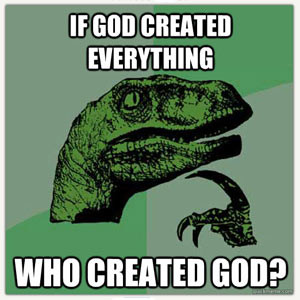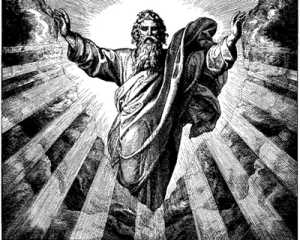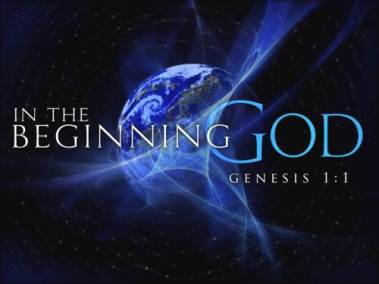Certainly the question of God’s existence crosses each person’s mind irrespective of whether you were born into a Christian household or not. We wonder if it is really true that there is a God and question whether we would be wasting our lives worshipping a non-existent God. It is a question that determines our final destination according to Saint Augustine. It is when we choose to either believe in God or reject him that our eternal home is prepared: heaven or hell. Some say that God is not as merciful as he claims to be if he sends people to hell; nonetheless, it is not that God is not merciful. His mercy was poured out for us on that cross; Jesus suffered more than any words could ever explain just to redeem you and I. When you choose to reject him now, in this life, you choose the devil’s side. That side is the side of rebellion and sin. What you are screaming to God is that “I do not want your goodness and I will take whatever consequence”. How is it that you can call him unmerciful? He is love but will not allow those who reject him to corrupt the paradise he prepared has for his children.
.

In my opinion, Saint Thomas Aquinas is an absolute genius. He presents God in the simplest yet outstanding view as he explained the existence of God. A study into Aquinas’ work brought me closer to God as I tried to understand the argument for God’s existence in a period of doubt and confusion concerning my faith. It was after watching the movie: God’s Not Dead that I got inspired to share this with you. I hope through this insightful study, you can obtain more knowledge and understanding regarding the existence of God yourself.
Saint Thomas Aquinas believed that God can reveal himself in two ways: Biblical revelation and natural revelation. Aquinas’ brand of philosophy is known as Thomism; he was a great scholar who contributed much to the Catholic Church, for example, in terms of providing the ‘Summa Theologica’ (‘A Summary of Theology’). He also wrote ‘Summa contra Gentiles’ for those who don’t believe in God. In Summa Theologica Aquinas attempts to prove the existence of God through empirical knowledge by presenting ‘the five ways’. Aquinas’ first three ways (Motion, Causation and Contingency) form the Cosmological Argument and this is what I will focus on.
The Cosmological Argument is an argument about origins: “What caused the universe to exist?” It is based on the Causal Principle that states: “upon the metaphysical intuition that something cannot come out of nothing”. The Cosmological Argument rests on Parmenides’ observation that “out of nothing, comes nothing”. Parmenides, a great philosopher, questioned “Why is there something rather than nothing?” He concluded that surely something must have started the whole universe off. Furthermore, Saint Thomas Aquinas realised that he could not explain the existence of the universe without making reference to that which is beyond our universe as our universe is contingent. Therefore, there must be an initial prime, uncaused, transcendent and necessary being which existed before anything and everything. I will further elaborate on this point.
 Firstly, Aquinas focused on ‘Motion’. He argued that everything is changed by something else. “Everything that is in motion must be moved by something for if it has not the source of its motion in itself. It is evident that it is moved by something other than itself, for there must be something else that moves it.” – Aristotle. Basically, nothing moves or changes by itself. The idea of ‘motion’ doesn’t just mean movement in terms of velocity or direction; it can also refer to the motion caused by change in an object’s state. For example, H2o molecules are in motion when heated and change from water to steam. However, Aquinas argued that there cannot be an infinite (unending) regress of things changing or moving other things. Therefore there must be a first prime (unmoved) mover which began all movement. According to Aquinas, this must be God.
Firstly, Aquinas focused on ‘Motion’. He argued that everything is changed by something else. “Everything that is in motion must be moved by something for if it has not the source of its motion in itself. It is evident that it is moved by something other than itself, for there must be something else that moves it.” – Aristotle. Basically, nothing moves or changes by itself. The idea of ‘motion’ doesn’t just mean movement in terms of velocity or direction; it can also refer to the motion caused by change in an object’s state. For example, H2o molecules are in motion when heated and change from water to steam. However, Aquinas argued that there cannot be an infinite (unending) regress of things changing or moving other things. Therefore there must be a first prime (unmoved) mover which began all movement. According to Aquinas, this must be God.
Secondly, there is the argument of causation where Aquinas argued that there had to be a cause of the Universe at the beginning of time. Aquinas said “There is no case known (neither is it, indeed, possible) in which a thing is found to be the efficient cause of itself; for so it would be prior to itself, which is impossible.” To elaborate, the law of cause and effect is relatively simple. Everything in the world has a cause; nothing is a cause to itself because that would be impossible; every cause has itself a cause. Everything needs something else to bring it into existence. For example you cannot be your own parent; you cannot exist before you exist! Again, Aquinas goes on to state that there cannot be an infinite regress of causes. He says that there must be an uncaused cause, or ‘first cause’ which causes everything to happen without itself being caused by anything else. Aquinas identifies this first cause as God.
 Finally, Aquinas presented the argument from contingency. He said everything in the world is contingent (subject to existence – meaning it can exist or cannot exist). To elaborate, individual things come into existence and later cease to exist. At one time NONE of them were in existence. Something comes into existence only as a result of something else already existing. For example people and animals exist as a result of procreation this demonstrates that they are dependent beings. This means there is a possibility they could not have existed. If everything cannot exist then there must have been a time where nothing existed. If there was a time when nothing existed there must have been an independent necessary being that began creation. By a necessary being I mean, this being is self-contained and must exist. It is upon this being, whom according to Aquinas is God, that all creation (existence) depends on. This being is identified as God; He has no beginning or end. God was not created, he has simply been and will continue to be (Hebrews 13:18).
Finally, Aquinas presented the argument from contingency. He said everything in the world is contingent (subject to existence – meaning it can exist or cannot exist). To elaborate, individual things come into existence and later cease to exist. At one time NONE of them were in existence. Something comes into existence only as a result of something else already existing. For example people and animals exist as a result of procreation this demonstrates that they are dependent beings. This means there is a possibility they could not have existed. If everything cannot exist then there must have been a time where nothing existed. If there was a time when nothing existed there must have been an independent necessary being that began creation. By a necessary being I mean, this being is self-contained and must exist. It is upon this being, whom according to Aquinas is God, that all creation (existence) depends on. This being is identified as God; He has no beginning or end. God was not created, he has simply been and will continue to be (Hebrews 13:18).
 If you are like these philosophers: Hume and Russell, you may argue: “Just because every human has a mother doesn’t mean humanity as a whole has one mother.” Nevertheless, without this necessary being (God), we would have to assume that there was an infinite regress of contingent beings and this would beg the question: ‘who created God?’ To ask this question would lead to an assumption that there was another creator before God. However, we are forced to stop asking that question and accept that God has always existed as an infinite being. Of course our finite minds may find it hard to understand but how can we understand a being that is greater than us? It is simply by believing through the application of faith. The Bible says “without faith it is impossible to please Him” (Hebrews 11:6). Still, one would argue that it requires greater faith to believe that the universe “just started or evolved out of nothing” rather than believing an omnipotent God created it. Some may say “I cannot take the Bible literally” but you have got to understand that his ways and thoughts are higher than ours (Isaiah 55:9). There is no way we can fully comprehend God but all he asks for is to put our trust and faith in him. Simple – but I know it can be hard!
If you are like these philosophers: Hume and Russell, you may argue: “Just because every human has a mother doesn’t mean humanity as a whole has one mother.” Nevertheless, without this necessary being (God), we would have to assume that there was an infinite regress of contingent beings and this would beg the question: ‘who created God?’ To ask this question would lead to an assumption that there was another creator before God. However, we are forced to stop asking that question and accept that God has always existed as an infinite being. Of course our finite minds may find it hard to understand but how can we understand a being that is greater than us? It is simply by believing through the application of faith. The Bible says “without faith it is impossible to please Him” (Hebrews 11:6). Still, one would argue that it requires greater faith to believe that the universe “just started or evolved out of nothing” rather than believing an omnipotent God created it. Some may say “I cannot take the Bible literally” but you have got to understand that his ways and thoughts are higher than ours (Isaiah 55:9). There is no way we can fully comprehend God but all he asks for is to put our trust and faith in him. Simple – but I know it can be hard!
Certainly this argument answers the puzzle of the existence of the universe however I know some of you may be asking: “Why do we need to explain the existence of the world anyway?” Well it is extremely important because in knowing who created you – and the world around you – you can also find out from this creator what your purpose is. Only the manufacturer of a product can really tell you what the product is for in order for it to be used to its full capacity. Consequently, with yourself, you can ask God “What am I here for?” He will certainly tell you and give you the grace to fulfil your life purpose. Above all, knowing your creator allows you to have a relationship that fills that void in your being that was reserved only for God.
 Genesis 1:26 says “God said, Let us make man in our image, after our likeness”. One may ask: Why is there a first person plural ‘us’? Well the ‘let us make’ in Hebrew is ‘na•‘ă•śeh’ and certainly it is a plural referring to an action done by more than one person. One view is that this is addressed to the Trinity: God the Father, Jesus the Son and the Holy Spirit – all of whom are one God! We are a reflection of God. He is three in one and what are we? Three in one: spirit, soul and body. On the other hand when reading Genesis 1:26, we must remember the era in which the Bible was written in. The plural ‘us’ was traditionally used by kings to denote majesty when referring to themselves. Nonetheless, the grammar does not decide the matter for us. The bottom line is that God created us and we were made in his image. (For more on this theme look at my recent post on ‘the nature and purpose of life’).
Genesis 1:26 says “God said, Let us make man in our image, after our likeness”. One may ask: Why is there a first person plural ‘us’? Well the ‘let us make’ in Hebrew is ‘na•‘ă•śeh’ and certainly it is a plural referring to an action done by more than one person. One view is that this is addressed to the Trinity: God the Father, Jesus the Son and the Holy Spirit – all of whom are one God! We are a reflection of God. He is three in one and what are we? Three in one: spirit, soul and body. On the other hand when reading Genesis 1:26, we must remember the era in which the Bible was written in. The plural ‘us’ was traditionally used by kings to denote majesty when referring to themselves. Nonetheless, the grammar does not decide the matter for us. The bottom line is that God created us and we were made in his image. (For more on this theme look at my recent post on ‘the nature and purpose of life’).
 Aquinas was well aware that the Cosmological Argument was rather crude and basic. He never intended his arguments to define God but to only to illustrate his existence. He presents the creator. This creator is a reality that underlies and sustains everything; it lies within and yet beyond all of the causes. Many scholars such as Frederick Copleston and Gottfried Leibniz and many theists agree with the Cosmological Argument. Ockham stated that God is a simple explanation and this is what strengthens Aquinas’ argument as it is easy to agree with.
Aquinas was well aware that the Cosmological Argument was rather crude and basic. He never intended his arguments to define God but to only to illustrate his existence. He presents the creator. This creator is a reality that underlies and sustains everything; it lies within and yet beyond all of the causes. Many scholars such as Frederick Copleston and Gottfried Leibniz and many theists agree with the Cosmological Argument. Ockham stated that God is a simple explanation and this is what strengthens Aquinas’ argument as it is easy to agree with.
To conclude, for me Aquinas’ simplicity amazes me as it is enough to help me comprehend this gigantic God that I serve. God did not need to create the world. As always remember that “God is love” (1 John 4:8) therefore love is a being that is alive. Love is best expressed toward someone else or something else as a result God created people and the universe as an expression of his amazing love. Always remember that God created the universe because of LOVE! He wants to love you and wants to be loved.
Please feel free to comment your thoughts about this topic. Also, I encourage you to watch the movie: God’s not Dead. You can watch the trailer below.
I really like the song as well!
Resources used:
- Summa Theologica
- Summa Contra Gentiles
- Aristotle’s Metaphysics
- Chronological Life Application Study Bible


Again great delivery! Well written I thoroughly enjoyed reading your blog post. Keep more coming!
LikeLiked by 1 person
Thank you so much!! 😀
LikeLike